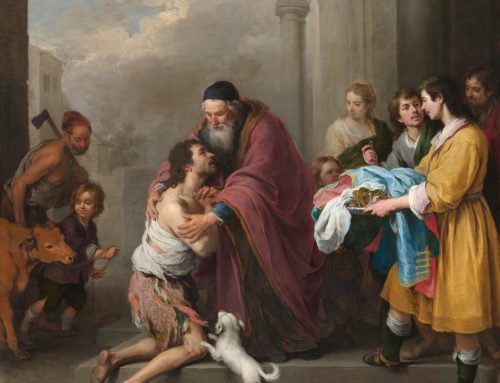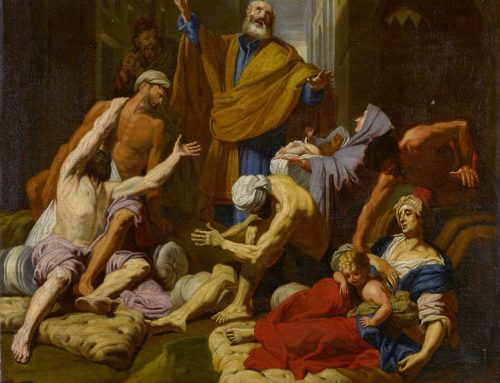
The Prayer at Valley Forge, Arnold Friberg, 1975.
Should Catholics be patriotic, having a love for their fatherland? According to the Catechism, “The love and service of one’s country follow from the duty of gratitude and belong to the order of charity” (CCC 2239). Catholic Church teaching is that patriotism is not an option; it’s a duty. Pope Leo XIII writing in 1890 indicated, “To love both countries, that of earth below and that of heaven above … is the essential duty of Christians” (Sapientiae Christianae, par 11). Patriotism is rooted in gratitude for the blessings we enjoy in our common home. Patriotism stems from an obedience to the fourth commandment, “Honor thy father and mother”, and is itself a virtue related to piety and the cardinal virtue of justice.
As the Catechism teaches, “The fourth commandment…shows us the order of charity. God has willed that, after him, we should honor our parents to whom we owe life and who have handed on to us the knowledge of God. We are obliged to honor and respect all those whom God, for our good, has vested with his authority” (CCC 2197). Those who are patriotic honor God who has vested the country with authority. As St. Paul writes, “Everyone must submit himself to the governing authorities, for there is no authority except that which God has established” (Romans 13:1). The book of Proverbs teaches, “Through me [God], kings reign and princes decree justice.” Christ tells Pilate, “You would have no power over me unless it had been given you from above” (John 19:11). Understanding that it is by Providence that any one nation’s rulers have temporal power mandates that we honor those in authority, simply because God put them there. The Catechism does caveat obedience, however. We are not commanded to follow blindly anyone in authority, especially if they are enacting immoral laws contrary to natural moral law or divinely revealed law.
The fourth commandment comes with blessings for those who obey and curses for those who don’t. Those who honor their parents (and authority) experience a better life because they are living in such a way as to honor God. Moses writes, “Honor your father and mother, as the Lord your God has commanded you, that you may live a long time, and it may be well with you in the land, which the Lord your God will give you” (Deuteronomy 5:16). There are many curses described in Scripture for disobedience to parents. Moses puts it succinctly in Exodus, “Cursed be anyone who dishonors his father or his mother” (Exodus 27:16). The Catechism sums it up thus: “The duty of obedience requires all to give due honor to authority and to treat those who are charged to exercise it with respect, and, insofar as it is deserved, with gratitude and good-will” (CCC 1900).
Patriotism can be seen as a form of familial love. This charity takes the form of being a good citizen, loving one’s neighbors. It informs our obligation to work for the common good and to preserve certain freedoms and fundamental human rights. On the contrary, to reject patriotism and love of one’s country is a violation of the fourth commandment and a serious offense to God. Catholics must love their homeland and this charity must manifest itself in efforts to work peacefully toward the good of all citizens.
St. Thomas Aquinas, regarding Patriotism, teaches, “The reverence given to our country includes homage to all our fellow-citizens and to all the friends of our country” (STh. II-II, q101, a1). Patriotism as a proper love and honor toward one’s country is a part of the virtue of piety; therefore, Patriotism is a virtue. As Aristotle taught, virtue is the golden mean. The virtue of Patriotism is found in the middle of two extremes: nationalism, and an ungratefulness for the blessings of one’s country. The former can lead to the conquest over other nations’ rights and the latter to a disordered violence against other citizens. True Patriotism pays honor to our earthly kingdom according to I Peter 2:17 yet confesses our true citizenship under Christ the King. Venerable Fulton Sheen in a speech from the 1950’s explains that Patriotism is a virtue that is akin to the virtue the Greeks and Latins called ‘Pietas.’ Pietas means love of God, love of neighbor, love of country. He states, “[When] we no longer have love of God, we no longer have love of country” (https://www.youtube.com/watch?v=2wAF1KiVY_c).
By offering God genuine worship and living according to his laws we become true Patriots. Several current prelates recently wrote concerning Patriotism, “All authority on earth as well as in heaven belongs to Jesus Christ; therefore, civil societies and all other associations of men are subject to His Kingship so that ‘the duty of offering God genuine worship concerns man both individually and socially” (“Declaration of the Truths Relating to Some of the Most Common Errors in the Life of the Church of Our Time”, Cardinal Raymond Leo Burke, Cardinal Janis Pujats, Archbishop Tomash Peta, Archbishop Jan Pawel Lenga, Auxiliary Bishop Athanasius Schneider, May 31, 2019, 29).
One of the most ancient prayers for country comes from Pope St. Clement, the 4th Pope, and is a beautiful legacy of the Catholic understanding of Patriotism. He prays for his nation’s rulers, “Grant to them, Lord, health, peace, concord, and stability, so that they may exercise without offense the sovereignty that You have given them. Master, heavenly King of the ages, You give glory, honor, and power over the things of earth to the sons of men. Direct, Lord, their counsel, following what is pleasing and acceptable in Your sight, so that by exercising with devotion and in peace and gentleness the power that You have given to them, they may find favor with You” (CCC 1900). As Catholic Patriots we must humbly pray for our rulers and our country. “Blessed is the nation whose God is the Lord!” (Psalm 33:12).





Leave A Comment